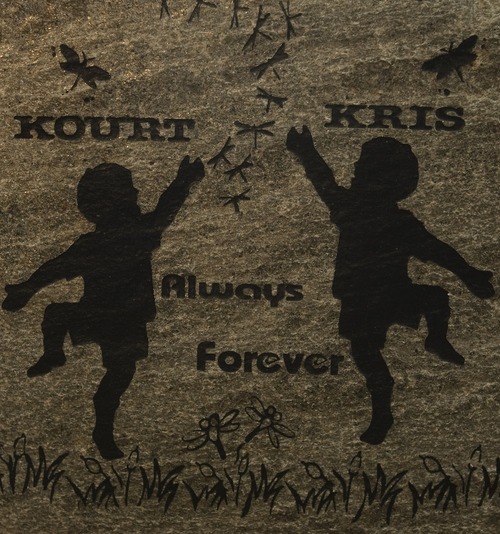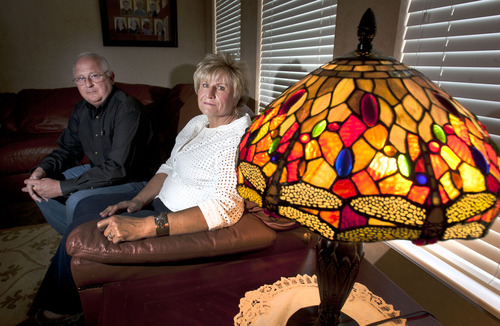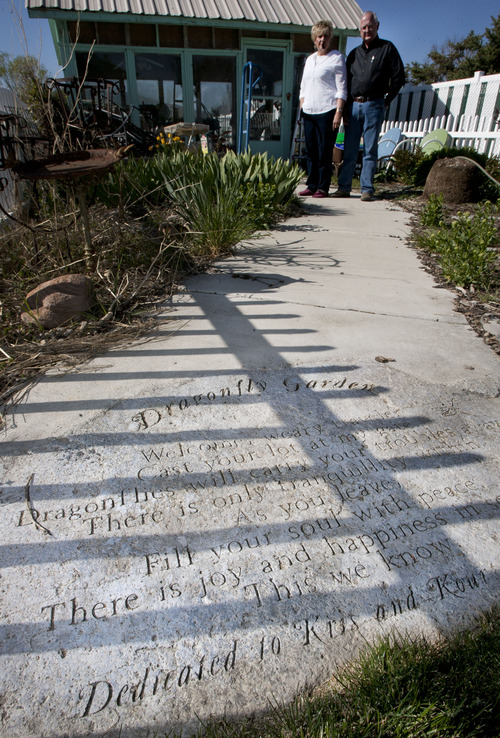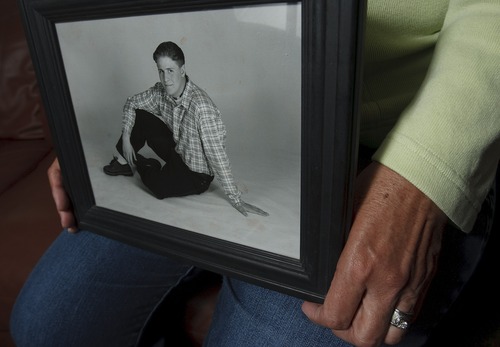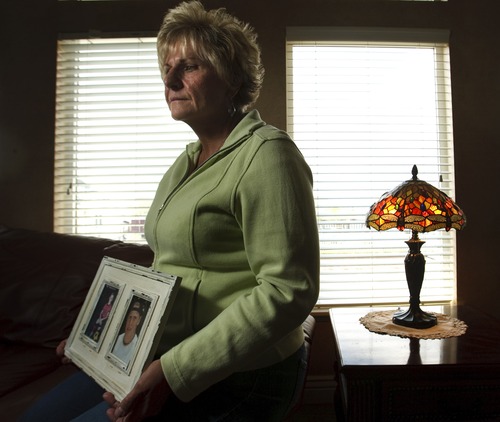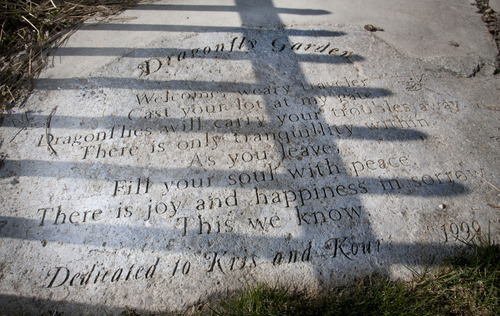This is an archived article that was published on sltrib.com in 2013, and information in the article may be outdated. It is provided only for personal research purposes and may not be reprinted.
Draper • As young brothers, Kris and Kourt McGuire often spent hours chasing the shimmering dragonflies that floated above a lush, green pasture behind their Draper home.
One day, when their mom told them to come inside to clean their room, they silently obeyed — or so she thought. After a time, she went to check on the two youngest of her four sons. She found their bedroom alive with dragonflies, which they had tied strings around, hanging them from the ceiling.
She smiled, and they all broke into laughter.
It's one of Lyn McGuire's favorite recollections of the two boys — a memory that predates the heartache of losing them both.
Kris died at age 8 in 1986, when a car hit him on the way to school. Kourt died about 10 years later, at age 17, killing himself amid depression and the still-stinging absence of his older brother.
Through the years, Ken and Lyn McGuire have found comfort in images of dragonflies, which now fill their home. The dragonflies remind them of warm memories and hope for the future.
They hope to bring that sense of comfort to other survivors of suicide, including through their Mormon faith. For years, the couple have run suicide-survivor groups, and they recently started one affiliated with The Church of Jesus Christ of Latter-day Saints that they're calling Dragonfly Haven. Though the group is open to all, they have met with LDS Family Services, which offered guidance and encouragement.
It's uncertain how many similar, faith-linked support groups might exist across Utah, but the McGuires hope their group fills a need as society becomes more willing to discuss suicide and how to prevent it. Many communities and individuals still struggle with how best to support those left behind. Survivors often find themselves navigating a world where few understand what they're experiencing or how to help them.
Lyn McGuire believes much can be accomplished simply by talking to those who've walked similar paths.
"They want to look across the room," she said of working with other suicide survivors, "and say, 'I know you know what I feel.' "
—
Changing attitudes • In recent decades, a number of religions' attitudes toward suicide have softened. Some faiths used to focus largely on what they saw as the sin of killing oneself.
In the past, Catholics who committed suicide were not allowed Christian burials, said Scott Dodge, deacon at the Catholic Diocese of Salt Lake City's Cathedral of the Madeleine. Until about 20 years ago, many evangelicals assumed those who committed suicide were headed to hell, said Greg Johnson, president of the Standing Together Ministries coalition of evangelical churches across the Wasatch Front. And it used to be that Mormons who committed suicide could not have church funerals or be buried in temple clothing.
That's no longer the case. Though most religions condemn suicide, there's an understanding, among many faiths, that those who take their own lives don't always have full control over their actions.
"What the [Catholic] church tends to recognize now," Dodge said, "is that most people who [commit suicide] suffer from probably a grave psychological problem or really deep depression or sometimes, sadly, that happens in the grips of some kind of addiction."
Johnson said he never would preach from the pulpit that those who take their own lives go to hell.
"The grace of God that saves a sinner from their sins," he said, "is the same grace that saves a sinner who commits suicide from being damned because life was somehow beyond their capacity to cope."
Similarly, the Mormon faith's Handbook 2 advises local LDS leaders that "it is wrong to take a life, including one's own. However, a person who commits suicide may not be responsible for his or her acts. Only God can judge such a matter." It further says that suicide victims may have Mormon funerals and be buried in temple clothing.
Such compassion extends to families of those who have killed themselves.
Johnson and Dodge said they are unaware of specific suicide-survivor support groups affiliated with their faiths in Utah, but local evangelical leaders do their best to offer help and many Catholic parishes have groups meant to comfort grieving families in general.
Dennis Ashton, counseling manager at LDS Family Services' Layton office, said he's found the LDS Church's attitude toward survivors to be accommodating, loving and accepting. But he said it's unusual for a lay couple within the faith, such as the McGuires, to volunteer to create a support group, especially dealing with loss. He said the couple reached out to the church when starting their group.
"It's come out of the love," Ashton said, "of their own child they've lost."
—
A need in the community • Taryn Aiken, chairwoman of the American Foundation for Suicide Prevention's Utah chapter, applauded the idea of such faith-affiliated groups.
When Aiken's father killed himself in 2002, she was impressed with how the LDS Church handled the tragedy. She said he had a Mormon funeral, and "there was no kind of condemnation or derogatory comment about his soul being lost."
She knew of no LDS-affiliated support group at the time, but said such assistance could help tremendously, noting her organization often refers survivors to those places.
"They need the support of the community," Aiken said. "They need to be able to talk about how their loved one died and why, and that they're not alone. So many of these families, they think they're the only ones who've experienced it because they don't talk about it."
Lyn McGuire said starting various survivor groups helped her when she lost Kourt to suicide.
"It helped with my anger," she said, "to direct it through a positive channel."
The couple approached the LDS Church this time out of a desire to fill a need in their community in their retirement.
"We [as a society] talk a lot about suicide and suicide prevention, but there really is another arm to this whole complex issue, and that's the bereavement side of it," Ken McGuire said. "That's so huge, and we don't do a very good job with it."
The couple emphasize, however, that though they're working with the church, their group is open to anyone and is not about religion.
Emotional discussions, not scripture readings, fill the meetings, which they hold in their home. The McGuires' groups generally meet for eight to nine weeks. Each week they discuss a different topic, ranging from self-blame to holidays to taking care of oneself.
Each meeting lasts three to four hours — not because of a schedule but rather to give survivors time to talk. The McGuires see their group as more of an educational mentoring group than a traditional support group.
It offers a chance, they said, for people who have all been through similar stresses to share their stories and learn from one another — without the ticking clock of a paid clinician's office. They have about 50 people in their current group.
"What that allows people to do is talk," Lyn McGuire said. "Talking is one of the best ways to heal."
The McGuires begin each group by telling their own story. They often hand out pins bearing images of dragonflies.
—
A lesson in living • Lyn McGuire said friends of suicide survivors often want them to move on, to be happy again. But people need to heal in their own time.
"People need to recognize it's going to take time for that person to find a new normal," she said, "for them to be back to laughing and caring and moving on and not so focused on the death that's happened to them."
She and her husband also try to teach group members that it's all right to enjoy their lives and their families again. Though suicide prevention is a vital message, Lyn McGuire said it's also important that survivors understand they can't blame themselves for what happened to their loved ones. Sometimes, she said, there are no signs.
The McGuires, for example, knew their son was depressed but otherwise he seemed to be doing well. He was a popular student at Alta High, always trying to take care of those around him. He didn't seem withdrawn.
They didn't realize the extent of his troubles until he shot himself in their backyard while his parents were at an out-of-state convention. The short suicide note Kourt left behind said, in part, that he couldn't go on living without his older brother.
"Sometimes there are no answers," Lyn McGuire said. "Sometimes, with teenagers, it's spontaneous, I think, and they don't realize how final it is."
Though the McGuires still feel the loss of their sons, they actively decided long ago not to miss out on the rest of their lives because of it. Instead, they enjoy their two living adult sons and seven grandchildren.
They keep smiling photos of their two boys — forever children — throughout the house. And their personal emblem of hope, the dragonfly, fills their home in subtle ways.
In one room, a drawing of a small dragonfly marks a wall. In another, a small resin dragonfly pokes out from the dirt of a potted plant.
In their backyard, overlooking the mountains, a large stone — leading to a garden that the McGuires hope to one day finish — bears this poem by Lyn McGuire:
Welcome, weary traveler.
Cast your lot at my gate.
Dragonflies will carry your troubles away.
There is only tranquility within.
As you leave, fill your soul with peace.
There is joy and happiness in sorrow.
This we know.
Twitter: @lschencker —
Learn more about suicide support and prevention
To contact Ken and Lyn McGuire about their group for suicide survivors, call 801-201-1518. For more resources, visit the American Foundation for Suicide Prevention's website, https://www.afsp.org/. To go to the Utah chapter's website, go to http://tinyurl.com/ce76um4.
To talk with someone, call the National Suicide Prevention Lifeline toll-free number 1-800-273-TALK. —
LDS policy on suicide
"It is wrong to take a life, including one's own. However, a person who commits suicide may not be responsible for his or her acts. Only God can judge such a matter.
"The family, in consultation with the bishop, determines the place and nature of a funeral service for a person who has died under such circumstances. Church facilities may be used. If the person was endowed, he or she may be buried in temple clothing."
Source: Handbook 2: Administering the Church


